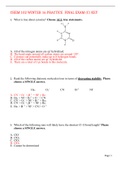What n2o is absorbed - Study guides, Class notes & Summaries
Looking for the best study guides, study notes and summaries about What n2o is absorbed? On this page you'll find 23 study documents about What n2o is absorbed.
Page 2 out of 23 results
Sort by

-
CHEM 102 WINTER 16 PRACTICE FINAL EXAM (C) KEY,100% CORRECT
- Exam (elaborations) • 14 pages • 2023
-
- $14.99
- + learn more
CHEM 102 WINTER 16 PRACTICE FINAL EXAM (C) KEY 1. What is true about cytosine? Choose ALL true statements. A. All of the nitrogen atoms are sp3 hybridized. B. The bond angle around all carbon atoms are around 120°. C. Cytosine can potentially make up to 8 hydrogen bonds. D. All of the carbon atoms are sp2 hybridized. E. There are a total of 3 pi bonds in this molecule. 2. Rank the following diatomic molecules/ions in terms of decreasing stability. Please choose a SINGLE answ...

-
Lab Flow - Chem 1A, questions and answers, 100% accurate answers
- Exam (elaborations) • 22 pages • 2023
-
Available in package deal
-
- $19.49
- + learn more
Lab Flow - Chem 1A, questions and answers, 100% accurate answers It is often helpful to remember the acronym PASS when using a fire extinguisher. Fill in the word that corresponds with each letter to complete the steps needed for operation of this device. P: Pull the pin. A: Aim the nozzle at the base of the fire. S: Squeeze the lever slowly. S: Sweep the spray from side to side over the fire. Identify the safety equipment designed to deal with each emergency listed. 1. cuts or mino...

-
CHEM 103 MODULE 3 NOTES
- Class notes • 27 pages • 2022
-
- $14.49
- + learn more
CHEM 103 MODULE 3 NOTES. 3.1: THERMOCHEMISTRY Thermodynamics is the study of the relationship between heat and other forms of energy, particularly mechanical work. Thermochemistry is the part of thermodynamics that deals with the quantity of heat given off or absorbed during a chemical reaction. The quantity of heat given off or absorbed during a physical change or temperature change can also be studied, and we will refer to this process as calorimetry. In order to adequately discuss thermoch...

-
CHEM 103 MODULE 3 NOTES.
- Exam (elaborations) • 27 pages • 2022
-
- $15.49
- + learn more
CHEM 103 MODULE 3 NOTES. 3.1: THERMOCHEMISTRY Thermodynamics is the study of the relationship between heat and other forms of energy, particularly mechanical work. Thermochemistry is the part of thermodynamics that deals with the quantity of heat given off or absorbed during a chemical reaction. The quantity of heat given off or absorbed during a physical change or temperature change can also be studied, and we will refer to this process as calorimetry. In order to adequately discuss thermoch...

-
CHEM 103 MODULE 3 NOTES.
- Exam (elaborations) • 29 pages • 2022
-
- $14.49
- + learn more
CHEM 103 MODULE 3 NOTES. 3.1: THERMOCHEMISTRY Thermodynamics is the study of the relationship between heat and other forms of energy, particularly mechanical work. Thermochemistry is the part of thermodynamics that deals with the quantity of heat given off or absorbed during a chemical reaction. The quantity of heat given off or absorbed during a physical change or temperature change can also be studied, and we will refer to this process as calorimetry. In order to adequately discuss thermoch...

-
CHEM 103 MODULE 3 NOTES.
- Exam (elaborations) • 27 pages • 2022
-
- $15.49
- + learn more
CHEM 103 MODULE 3 NOTES. 3.1: THERMOCHEMISTRY Thermodynamics is the study of the relationship between heat and other forms of energy, particularly mechanical work. Thermochemistry is the part of thermodynamics that deals with the quantity of heat given off or absorbed during a chemical reaction. The quantity of heat given off or absorbed during a physical change or temperature change can also be studied, and we will refer to this process as calorimetry. In order to adequately discuss thermoch...

-
CHEM 103 MODULE 3 NOTES
- Class notes • 27 pages • 2022
-
- $14.49
- + learn more
CHEM 103 MODULE 3 NOTES. 3.1: THERMOCHEMISTRY Thermodynamics is the study of the relationship between heat and other forms of energy, particularly mechanical work. Thermochemistry is the part of thermodynamics that deals with the quantity of heat given off or absorbed during a chemical reaction. The quantity of heat given off or absorbed during a physical change or temperature change can also be studied, and we will refer to this process as calorimetry. In order to adequately discuss thermoch...

-
CHEM 103 MODULE 3 NOTES.
- Exam (elaborations) • 27 pages • 2022
-
- $15.49
- + learn more
CHEM 103 MODULE 3 NOTES. 3.1: THERMOCHEMISTRY Thermodynamics is the study of the relationship between heat and other forms of energy, particularly mechanical work. Thermochemistry is the part of thermodynamics that deals with the quantity of heat given off or absorbed during a chemical reaction. The quantity of heat given off or absorbed during a physical change or temperature change can also be studied, and we will refer to this process as calorimetry. In order to adequately discuss thermoch...

-
CHEM 103
- Exam (elaborations) • 27 pages • 2022
-
- $14.49
- + learn more
CHEM 103 MODULE 3 NOTES. 3.1: THERMOCHEMISTRY Thermodynamics is the study of the relationship between heat and other forms of energy, particularly mechanical work. Thermochemistry is the part of thermodynamics that deals with the quantity of heat given off or absorbed during a chemical reaction. The quantity of heat given off or absorbed during a physical change or temperature change can also be studied, and we will refer to this process as calorimetry. In order to adequately discuss thermoch...

-
Full notes for entirety of unit 2 AP environmental science
- Class notes • 30 pages • 2024
- Available in package deal
-
- $11.49
- + learn more
Notes for the entire of AP environmental science unit 2- The Living World- Biodiversity Competition can be between two different species (interspecies competition) or within a population of the same species (intraspecies competition) When organisms or groups of organisms compete, it can limit or even stop the growth of one of the organisms or groups, leading to extinction. However, competition can also lead to greater biodiversity. If two groups are competing for the same limited res...

How did he do that? By selling his study resources on Stuvia. Try it yourself! Discover all about earning on Stuvia


